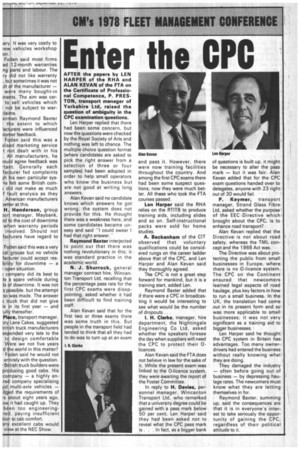ter the CPC
Page 33

If you've noticed an error in this article please click here to report it so we can fix it.
AFTER the papers by LEN HARPER of the RHA and ALAN KEVAN of the FTA on the Certificate of Professional Competence, P. PRESTON, transport manager of Yorkshire Ltd, raised the question of ambiguity in the CPC examination questions.
Len Harper replied that there had been some concern, but now the questions were checked by the Royal Society of Arts and nothing was left to chance. The multiple choice question format (where candidates are asked to pick the right answer from a selection of three or four samples) had been adopted in order to help small operators who know the business but are not good at writing long answers.
Alan Kevan said no candidate knows which answers he got wrong; the system does not provide for this. He thought there was a weakness here, and some candidates became un easy and said could swear had that right answer.'' Raymond Baxter interjected to point out that there was nothing revolutionary in this: it was standard practice in the academic world, N. J. Shurrock, general manager contract hire, Wincanton Transport Ltd, recalling that the percentage pass rate for the first CPC exams were disappointing, asked whether it had been difficult to find training staff.
Alan Kevan said that for the first two or three exams there was some truth in this. But people in the transport field had tended to think that all they had to do was to turn up at an exam and pass it. However, there were now training facilities throughout the country. Arid among the first CPC exams there had been some suspect questions; now they were much better. All these who took the FTA courses passed.
Len Harper said the RHA relies on the RTITB to produce training aids, including slides and so on. Self-instructional packs were sold for home studies.
A. Beckenham of the CIT observed that voluntary qualifications could be considered rungs on the career ladder above that of the CPC, and Len Harper and Alan Kevan said they thoroughly agreed.
The CPC is not a great step forward for mankind, but it is a training start, added Len.
Raymond Baxter added that if there were a CPC in broadcasting it would be interesting to see what would be the number of dropouts . .
I. H. Clarke, manager, hire department, the Nightingale Engineering Co Ltd, asked whether the speakers foresee the day when suppliers will need the CPC to protect their 0licences.
Alan Kevan said the FTA does not believe in law for the sake of it. While the present exam was linked to the 0-licence system, they were awaiting the report of the Foster Committee.
In reply to H. Davies, personnel manager, Wincanton Transport Ltd, who remarked that a university degree could be gained with a pass mark below 50 per cent, Len Harper said they had been asked not to reveal what the CPC pass mark
is . . In fact, as a bigger bank of questions is built up, it might be necessary to alter the pass mark — but it was fair. Alan Kevan added that for the CPC exam questions handed over to delegates, anyone with 23 right out of 30 would fail.
P. Keymer, transport manager, Strand Glass Fibre Ltd, asked whether the purpose of the EEC Directive which brought about the CPC, is to enhance road transport?
Alan Kevan replied that the Directive is not about road safety, whereas the TML concept and the 1968 Act was.
The Directive was about protecting the public from small businesses in Europe, where there is no 0-licence system. The CPC on the Continent ensured that newcomers learned legal aspects of road haulage, plus key factors in how to run a small business. In the UK, the translation had come .out in its present form and so was more applicable to small businesses; it was not very significant as a training aid to bigger businesses.
Len Harper said he thought the CPC system in Britain has advantages. Too many ownerdrivers had entered the business without really knowing what they are doing.
They damaged the industry — often before going out of business — by depressing haulage rates. The newcomers must know what they are letting themselves in for.
Raymond Baxter, summing up, said the consequences are that it is in everyone's interest to take seriously the opportunity of gaining the CPC, regardless of their political attitude to it.




























































































































